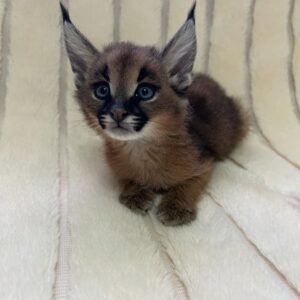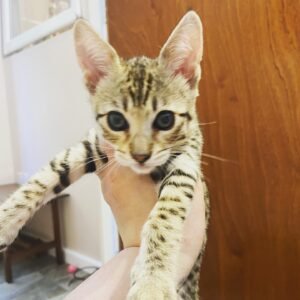Savannah Kittens for sale
Savannah Kittens, the Savannah Cat is a remarkable mix of a medium-sized African Serval and a domestic cat that is called after the first kitten, Savannah, who was born in 1986. Their markings, which are their most distinguishing trait, are due to their wild cat origin.
There are several generations that are all quite similar, although the Serval’s bigger size has been preserved in the rarer first generation. While first-generation Savannahs are still available, they are far more expensive than later generations.
The Savannah is sleek and slim, with long legs, a graceful neck, and tall, wide ears. Their long legs give them the appearance of being larger than most domestic cats.
Savannah Kittens’ personality and behavior
Savannah Cats have a gentle disposition and are lively, adventurous, and loyal, making them an excellent companion for youngsters and other pets.
This breed is notorious for being a prankster, hiding from you and then hitting you when you’re not looking, climbing high and knocking things down, and generally being a nuisance, often at your expense. Fortunately, it’s all in good fun, and they don’t mean any harm, so you’ll learn to accept it, but you should be aware of this behavior before committing to the Savannah Cat.
Unlike other cats, they enjoy playing in water, which is fun and frequently entertaining, but make sure any ponds or fish tanks are cat proofed.
They’re a highly bright and active breed that requires a lot of stimulation, so make sure you have plenty of toys, puzzles, and climbing areas to keep them engaged and prevent mischief.
Savannah cats’ ideal owner or home
This lively, bright, and naughty species may not be the greatest choice for a first-time owner because they require a lot of care and can be difficult to train at times.
They retain their wild cat ancestors’ hunting instincts; therefore, they aren’t suited for homes with tiny pets such as rabbits, guinea pigs, birds, or even fish.
In addition to being experienced, their owner must be full of love and eager to play and interact with them, since if they don’t get the play and attention they desire, they will make their demands in less subtle ways.
Savannah cats can be excellent with other cats and dogs, as well as children, if properly socialized as kittens.
Savannah Cat Grooming
Although the Savannah is a low-shedding breed that requires less care than most, it still needs to be combed weekly to keep its coat healthy and free of loose, dead hair.
To avoid painfully breaking the nails if/when they get caught in carpet or furniture, trim them as needed, which is usually monthly. Get your kitten acclimated to having their nails cut as a kitten to make this process easier for both you and your cat.
Check their ears once a week for infection, which manifests as unusual redness, unpleasant odour, and occasionally discharge, among other signs. Clean them with a cotton ball wet with a gentle cleanser recommended by your veterinarian to avoid infection.
Finally, to avoid costly dental treatment at the veterinary clinic, wash their teeth periodically to avoid tartar buildup and gum disease. Grooming a Savannah cat should be simple because they enjoy the attention.
Temperament
A Savannah is perhaps not the greatest pick if you’re searching for a sleepy lap cat. Savannahs can leap an incredible 8 feet in height, so she’s more likely to leap onto the tops of your kitchen cupboards than she is to sit idly by her food bowl.
The Savannah cat is sometimes described as more dog-like than cat-like, as it is always looking for new challenges to investigate. These slim and nimble felines adore water and will gladly leap into the bathtub with you or splash around in a kiddie pool. Savannahs are also easy to teach, and some owners choose to walk their cats on a leash and take them on adventures outside.
-
African Caracals Kittens, Savannah Kittens
African Caracals Kitten Female
Original price was: €1,290.00.€1,250.00Current price is: €1,250.00. -
African Caracals Kittens, Savannah Kittens
African caracals kitten Male
Original price was: €1,490.00.€1,350.00Current price is: €1,350.00. -
Savannah F1 Kittens, Savannah Kittens
Buy Savannah F1 Female
Original price was: €2,200.00.€2,150.00Current price is: €2,150.00. -
Savannah F1 Kittens, Savannah Kittens
Buy Savannah F1 Male
Original price was: €2,450.00.€2,350.00Current price is: €2,350.00. -
Serval Kittens
Buy Serval Kitten Male
Original price was: €2,000.00.€1,950.00Current price is: €1,950.00. -
Serval Kittens
Buy Servals Kitten Female
Original price was: €1,950.00.€1,900.00Current price is: €1,900.00. -
African Caracals Kittens, Savannah Kittens
Caracals kitten Male
Original price was: €1,500.00.€1,450.00Current price is: €1,450.00. -
Savannah F1 Kittens, Savannah Kittens
Savannah F1 Male
Original price was: €2,000.00.€1,950.00Current price is: €1,950.00. -
Serval Kittens
Serval Kitten Female
Original price was: €1,500.00.€1,450.00Current price is: €1,450.00.

















